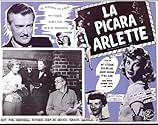Aggiungi una trama nella tua linguaArlette is a malicious schoolgirl who uses her feminine charms to attract, and then destroy, every man gullible enough to respond to her flirtations. She sets her cap for the art professor a... Leggi tuttoArlette is a malicious schoolgirl who uses her feminine charms to attract, and then destroy, every man gullible enough to respond to her flirtations. She sets her cap for the art professor and very nearly does him in... but his loving wife and daughter help the deluded man escape... Leggi tuttoArlette is a malicious schoolgirl who uses her feminine charms to attract, and then destroy, every man gullible enough to respond to her flirtations. She sets her cap for the art professor and very nearly does him in... but his loving wife and daughter help the deluded man escape the seductive mantrap.
- Regia
- Sceneggiatura
- Star
Recensioni in evidenza
Hugh Williams was a romantic hero in his earlier career, but by 1949 he is pretty far from being love's young dream. Combined with Mai Zetterling's atrocious accent and the fact we know she is taking him for a ride, there's no real romance to be found here.
Some interesting parallels may be found with Girls' Dormitory (1936) where schoolmaster Herbert Marshall is seduced by French schoolgirl Simone Simon. Marshall is at least single in that one, and Simon's accent is happily authentic. Both films feature a scene in a hut in the middle of a storm, where Hugh/Herbert "rescues" Mai/Marie. There is surely a deliberate parallel or influence there.
As others have mentioned, the spanking scene at the end is frankly outrageous (though amusing for being so) and it's amazing it got past the censors. The silhouetting reminded me of the scene in Seinfeld episode "The Contest" where George visits his mother in hospital. It's very reminiscent of a Carry On film as well.
Unlike many reviewers have claimed: it isn't the case that this student-teacher relationship would be "illegal" in the UK these days. Mai's character is 18 and therefore legally able to consent - the "position of trust" legislation enacted in 2001 does not apply to legal adults. Hugh would doubtless be sacked, but he wouldn't face criminal charges. Unethical, and unwise, but not illegal.
For a 1949 British movie, this is very mature and telling, with a fine performance by Miss Grahame. Nonetheless, the thought struck me, about halfway through, that it was all too conventional, that all the issues were just the sort that one would expect, and I began to wonder what would happen were the girl's school's St. Trinian's or had the movie been directed by Henri-George Clouzot. Did Ronald Searle see this movie and add it to the seething mass of cartoons that inspired the movies? Did Clouzot look at it and snarl "Au diable avec les edutiantes!" and start working on LES DIABOLIQUES? I'm not sure how useful comments like these are for appraising a perfectly decent and watchable British movie that has little to do with either of those works. It's simply that, somehow, I think they are.
Lo sapevi?
- QuizFilm debut of Christine Finn.
- BlooperWhen Arlette reads the second verse of P.B. Shelley's "Love's Philosophy" she says "What's all this kissing worth, if thou kiss not me". The correct line is "What is all this sweet work worth, if thou kiss not me".
- Citazioni
Arlette Tessereau: I am turning this child into a woman!
I più visti
Dettagli
- Tempo di esecuzione1 ora 20 minuti
- Colore
- Proporzioni
- 1.37 : 1
Contribuisci a questa pagina

























